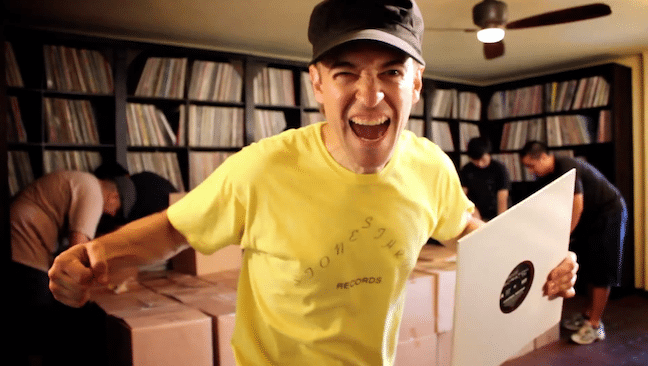Pitchfork: Our Vinyl Weighs a Ton, written by Jonah Bromwich
Stones Throw Records founder Chris Manak (better known as Peanut Butter Wolf) grew up a military brat with a deep love for music. Our Vinyl Weighs a Ton, Jeff Broadway's recent documentary about the Los Angeles label, features plenty of footage of Wolf as a kid, precociously engaged in both collecting and recording music. An early segment shows him taping his own radio show, on which he spins selections from Marvin Gaye, Michael Jackson and Tina Turner. The show ends suddenly, when the DJ starts griping about a book report he has yet to finish.
Kernels of Stones Throw's ethos appear early in the film (which is currently on tour, and screens this Sunday in Brooklyn). Wolf is fascinated by different genres of music, and though he enjoys performing himself, he usually does so with a more charismatic friend leading the way. The most noteworthy of these is, fittingly, the rapper Charizma, with whom Wolf forms a hip-hop duo and ends up signed to the Disney-owned Hollywood Basic Records. Though the film avoids discussion of the troubles Charizma and Wolf had with the label (which didn’t end up having much interest in releasing their music), it does an admirable job of getting at the pressure that dogged the two, particularly Charizma. This downturn in creative momentum leads into the tragedy from which Stones Throw was born: the murder of Charizma, in a botched carjacking in 1993.
Our Vinyl Weighs a Ton much like the label it profiles, is pleasantly off-kilter. After Charizma’s death, we don’t continue to the birth of Stones Throw—there’s a detour, featuring artists from the label’s current roster. Soon enough though, we’re thrown back into Stones Throw’s founding in 1996, and its eventual recruitment of three flagship artists: Madlib, MF DOOM, and J Dilla.
We tend to think of established musicians as being somehow preordained, so it’s inspiring to see Stones Throw’s humble beginnings, originally run out of a former bomb shelter. Madlib played music all hours of the day; long-time label brass Eothen Alapatt (better known as Egon) pressed records in the front and art director Jeff Jank designed logos in the basement. They resemble any other group of young creatives, though of course, their future careers and the reverence they’re afforded by their more recognizable peers signifies their importance.
That’s the greatest thrill of Our Vinyl Weighs a Ton both for Stones Throw fans and newcomers alike: watching well-established artists closely consider the Stones Throw roster. Broadway films in-depth interviews with everyone from Mike D of the Beastie Boys, to Geoff Barrow of Portishead, to the recluses Madlib and DOOM, to Kanye West. The artists assembled come across as a star-studded collection of talking heads, though, but as people who feel deeply about Stones Throw. In talking about the label, their personalities emerge.
Kanye analyzes the respective approaches of J. Dilla and Madlib. Common, who used Dilla beats as a cornerstone of his sound, reflects on how difficult it was for the producer to be trapped in his hometown, surrounded by the needs of all the people he grew up with. The rapper grows introspective, almost as if he’s talking about himself. To see the tiny label pull genuine reflection out of name-brand artists drives home the key takeaway from Our Vinyl Weighs a Ton: People almost completely off-the-grid can and do have a profound influence on people whose names appear in marquee lights.
One of the more frustrating elements of Our Vinyl Weighs a Ton involves the actual creation of music. Throughout the film, we hear tracks from classic albums like Madvillainy, Champion Sound, and ToEachizown, but there's a lack of details surrounding the creation of the music itself. Donuts, for instance, is couched in the sad story of Dilla’s disease and eventual death, but there is little talk of the album’s creation from Jay Dee’s hospital bed, or the meaning that the samples he chose had for those close to him.
Stones Throw die-hards may thirst for these details, but the absence of label mythology indicates Broadway’s commitment to even-handedness. He’s straightforward about the wilderness period the label faced after Dilla passed: Wolf lost his primary interest in hip-hop and the label seemed to divorce itself from its original brand, alienating loyal fans in the process.
But there is redemption of sorts in the arrival of a second wave of artists that includes Aloe Blacc, Mayer Hawthorne and Dam-Funk (though the documentary notes that the first two have since left for bigger labels). The relative success of Stones Throw, though, is not the film’s primary concern. It’s the approach that’s emphasized, a purist’s dream of building a record label. The idea is neither glamorized nor mocked. It’s shown to be a path that yields plenty to celebrate but also a good amount of forgettable music and a negligible amount of money.
We like to think that the lines of musical history are easily traceable. From Chuck Berry to the Beatles, to prog, punk, metal, the birth of rap and everything else, easily slotted into neat little categories. But Our Vinyl Weighs a Ton reminds us how chaotic things are, how many great artists and how much great music slips through the cracks. Dilla became a marquee name of sorts, but there are plenty of other artists at Stones Throw (and elsewhere) who continue to influence the names we all recognize.
